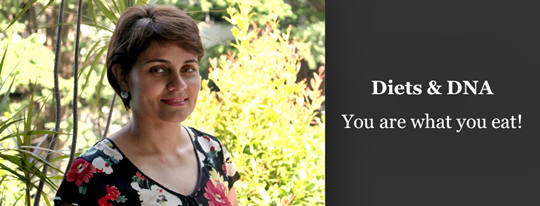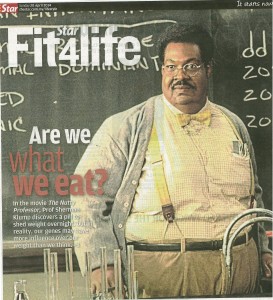
[The Star] Diet and DNA: The mysterious link between genes and eating habits

Have you ever asked yourself, why am I not losing any weight despite exercising so hard? The answer might actually lie in your genes. – Filepic
Breakthrough research in the field of nutrigenomics may actually contain answers to the puzzling link between our genes and eating habits.
In this age of information, we are constantly bombarded with a barrage of do’s and don’ts on healthy eating and losing weight – each promising you easier and quicker weight-loss and wellness solutions. We continue looking for the ultimate diet solution – one that can magically dissolve fat and reduce weight while we continue chomping on all our favourite foods.
While science may not have stumbled upon that magic solution just yet, it has certainly made some ground breaking strides in the study of genetics and how they can influence our eating habits.
It appears that the answers to questions like: “Why am I exercising but not losing weight?”, “Why do I put on weight when I hardly eat?” and “Why has my friend lost more weight than I have on the same diet plan?” could all be contained inside our own DNA.
According to experts, our genes or DNA can now reveal why we may be naturally predisposed to weight gain, have low metabolism, cannot process or store sugar effectively, or are unable to discard toxins from our bodies.
It’s in the Genes
The science of nutrition and dietetics have joined forces with genomics (the study of genes), in a revolutionary field known as nutrigenomics, which sheds some light on how and why different people react to certain foods or nutrients.
“Nutrigenomics is an emerging discipline that explores the benefits of food on the individual. It identifies the different genetic makeup of each individual, and which type of food is suitable for the individual according to their genetic makeup – basically it is how food talks to our genes. Understanding this can help to bring out the greatest potential in our genes,” explained Dr. Surinder Gill, Primary Care and Family Physician at Kuala Lumpur Sports Medicine Centre (KLSMC).

Dr Surinder… Nutrigenomics helps us identify the genes that are working in your favour, and more importantly, those that are working against you. – Kuala Lumpur Sports Medicine Centre
According to Dr. Surinder, nutrigenomics removes the guesswork from healthy eating as it identifies exactly what type of nutrients everybody needs or doesn’t need.
“Most of us today take many supplements because of what we read and discuss with our friends; because we think our body is lacking nutrients and therefore we need to replenish them. In actual fact, it is more important to determine if we lack any nutrients at all and if so which nutrient and how much is it lacking. This is one of the major roles that nutrigenomics can play in healthcare today, in simple terms it is like how we decide to buy clothes based on our body type, shape and size ,” she said.
The process begins with a genetic profile, where the individual’s genes are mapped out, to better understand how the genes can affect the person’s health and wellbeing. This genetic profile is performed from tissue sample obtained from the buccal mucosa (inner aspect mouth) by taking a simple painless swab.
Dr Surinder explained,”The initial consultation begins with a detailed interview and history taking which involves the patient’s medical and family history as far back as three generations. Following that, the genetic profiling and specific blood tests are performed to enable us to determine genes that are working in your favour and more importantly, genes that are working against you. With this information, you can then recommend appropriate lifestyle and dietary actions in order to activate and deactivate the genes accordingly.”
As nutrigenomics continues to advance, healthcare professionals would be able to tailor dietetic advice to each individual based on his or her genetic profile. This form of “personalised medicine” is the direction that the healthcare industry worldwide is moving towards.
The “ Variation in the Gene”
 Perhaps one of the key breakthroughs of nutrigenomics is its ability to determine an individual’s predisposition to certain Non-communicable Diseases (NCD), such as obesity, cancer, heart disease and diabetes.
Perhaps one of the key breakthroughs of nutrigenomics is its ability to determine an individual’s predisposition to certain Non-communicable Diseases (NCD), such as obesity, cancer, heart disease and diabetes.
This is especially useful as Malaysia continues to see an alarming increase in obesity and diabetes. Malaysia is currently ranked sixth in Asia Pacific for obesity, and tops the list in Southeast Asia for both obesity and diabetes – making NCDs a critical area of concern for local healthcare professionals.
Reduced physical activity in daily life and increased availability of cheap calorie – dense foods, are the main culprits of obesity epidemic. However we have noticed that the enviroment is not the only contributing factor. Increasing studies have shown that genetic make-up maybe more important than the environment. This explains why some people become obese and others don’t, even when exposed to similar enviroment.
Nutrigenomics attempts to identify the variation in the gene that can help to understand deferring eating patterns, fat metabolism and respond to exercise that are linked to the different genetic make-up.
According to Dr Surinder, one of the key areas that are examined during genetic profiling is fat metabolism, which affects the way a person’s body responds to food and exersice. This is the reason why some people put on weight despite not eating much and others don’t seem to gain any weight despite having huge appetites.
“What we have found out is that there’s a variation of gene in these people, where their stomach is unable to send a signal to the brain to indicate that they are full. For example, I had a patient – a 45-year-old male who used to eat 20 roti canai for breakfast every day and never felt full!” shared Dr Surinder.
Despite exercising daily and skipping his other meals, this patient kept putting on weight. Not surprisingly, he also had a host of other health problems such as high blood sugar and high cholesterol and high blood pressure.
“The genetic profiling revealed that he carried the ‘variation gene’. So I advised what he should be doing according to his gene variation.
As a result, in just six months, the patient managed to shed almost 30 kg off his weight – going from 120kg to 93kg. He was able to go off his medication and felt much healthier.
This opens up a new horizon for preventive medicine, as it enables healthcare professionals to increase the quality of life and living, given the rising life expectancy rates.
“People are living quite long these days, but we find that the “dying process” is also very long. In other words, many older or elderly people don’t have good quality of life because they are ill or bedridden.. We can’t add on the number of years to age, but we can improve the quality of life to ensure that patients live independently for as long as possible,” said Dr Surinder.
Source: The Star
Leave a reply